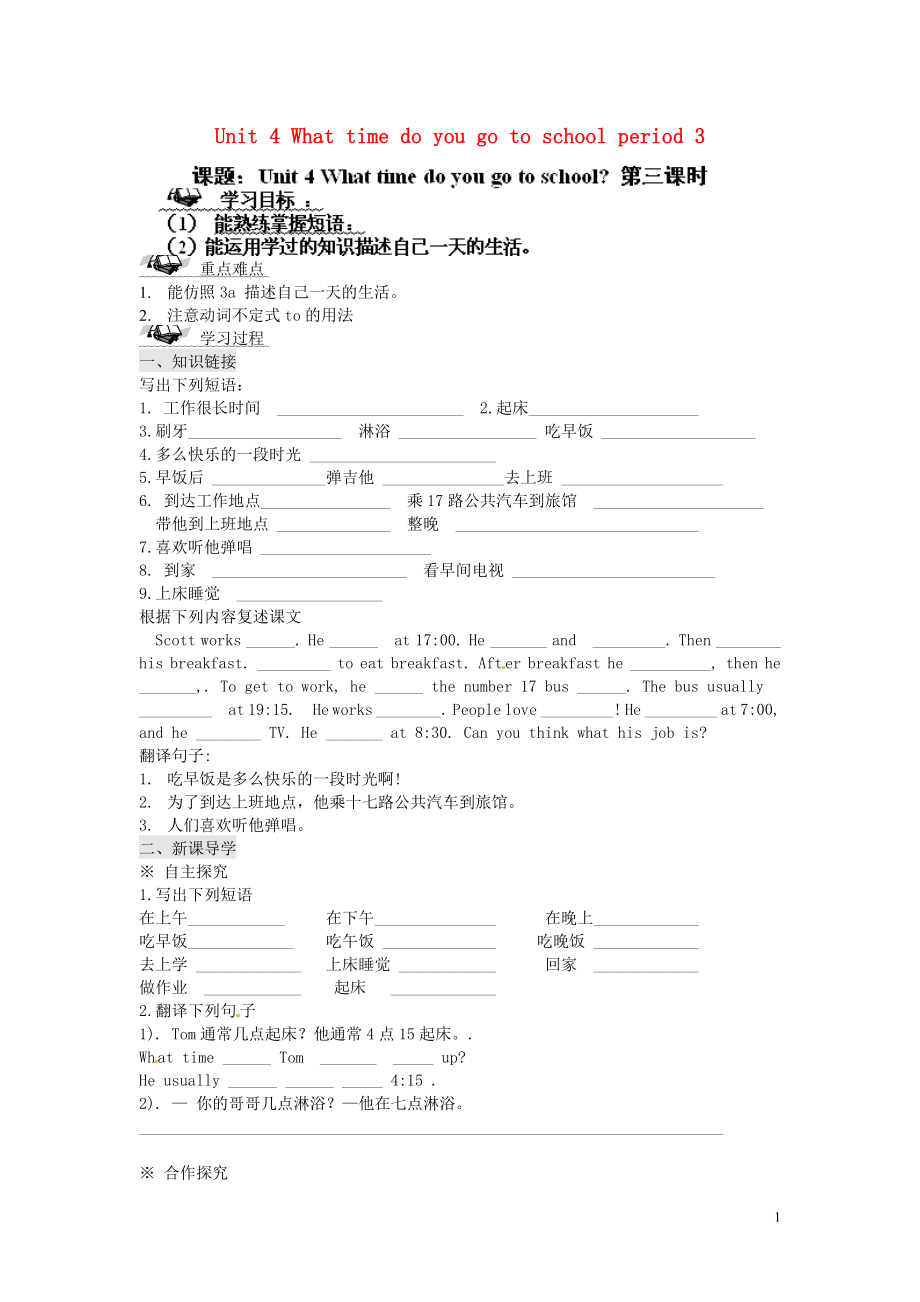《山東省青島市城陽(yáng)區(qū)第七中學(xué)六年級(jí)英語(yǔ)下冊(cè) Unit 4 What time do you go to school period 3導(dǎo)學(xué)案(無(wú)答案) 魯教版五四制》由會(huì)員分享��,可在線閱讀���,更多相關(guān)《山東省青島市城陽(yáng)區(qū)第七中學(xué)六年級(jí)英語(yǔ)下冊(cè) Unit 4 What time do you go to school period 3導(dǎo)學(xué)案(無(wú)答案) 魯教版五四制(2頁(yè)珍藏版)》請(qǐng)?jiān)谘b配圖網(wǎng)上搜索。
1�、
Unit 4 What time do you go to school period 3
重點(diǎn)難點(diǎn)
1. 能仿照3a 描述自己一天的生活。
2. 注意動(dòng)詞不定式to的用法
學(xué)習(xí)過(guò)程
一���、知識(shí)鏈接
寫(xiě)出下列短語(yǔ):
1. 工作很長(zhǎng)時(shí)間 _______________________ 2.起床_____________________
3.刷牙___________________ 淋浴 _________________ 吃早飯 ___________________
4.多么快樂(lè)的一段時(shí)光 _______________________
5.早飯后 _
2��、_____________彈吉他 _______________去上班 ____________________
6. 到達(dá)工作地點(diǎn)________________ 乘17路公共汽車(chē)到旅館 _____________________
帶他到上班地點(diǎn) ______________ 整晚 ______________________________
7.喜歡聽(tīng)他彈唱 _____________________
8. 到家 ________________________ 看早間電視 _________________________
9.上床睡覺(jué) __________
3���、________
根據(jù)下列內(nèi)容復(fù)述課文
Scott works ______. He ______ at 17:00. He _______ and _________. Then ________ his breakfast. _________ to eat breakfast. After breakfast he __________, then he _______,. To get to work, he ______ the number 17 bus ______. The bus usually _________ at 19:15. He works __
4、______. People love _________! He _________ at 7:00, and he ________ TV. He _______ at 8:30. Can you think what his job is?
翻譯句子:
1. 吃早飯是多么快樂(lè)的一段時(shí)光啊!
2. 為了到達(dá)上班地點(diǎn)���,他乘十七路公共汽車(chē)到旅館�。
3. 人們喜歡聽(tīng)他彈唱�����。
二���、新課導(dǎo)學(xué)
※ 自主探究
1.寫(xiě)出下列短語(yǔ)
在上午____________ 在下午_______________ 在晚上_____________
吃早飯_____________
5���、 吃午飯 ______________ 吃晚飯 _____________
去上學(xué) _____________ 上床睡覺(jué) ____________ 回家 _____________
做作業(yè) ____________ 起床 _____________
2.翻譯下列句子
1). Tom通常幾點(diǎn)起床?他通常4點(diǎn)15起床���。.
What time ______ Tom _______ _____ up?
He usually ______ ______ _____ 4:15 .
2). — 你的哥哥幾點(diǎn)淋?��。俊谄唿c(diǎn)淋浴�����。
_________
6�����、_______________________________________________________________
※ 合作探究
Group work:
談?wù)撊藗內(nèi)粘I畹臅r(shí)間。
eg: 人們通常什么時(shí)候吃早飯�? 人們?cè)谏衔绯栽顼垺?
— When do people usually eat breakfast?
— People usually eat breakfast in the morning .
討論:這里的when 能不能換成what time.
學(xué)了就用:
pairwork: 用上面的短語(yǔ)來(lái)練習(xí)句型
※ 拓展延伸
動(dòng)耳動(dòng)手:li
7、stening 2a,2b
三���、總結(jié)提升
※ 學(xué)習(xí)小結(jié)
談?wù)撊藗內(nèi)粘I畹臅r(shí)間��。
※ 自我評(píng)價(jià) 你完成本節(jié)導(dǎo)學(xué)案的情況為( ).
A. 很好 B. 較好 C. 一般 D. 較差
※ 達(dá)標(biāo)檢測(cè)(時(shí)量:5分鐘 滿分:100分)計(jì)分:
(一) 根據(jù)要求完成句子
1. We all love to l ________to our English teacher.
2. There're sixty minutes(分鐘)in an h_______.
3. Where do you usually do your h__________(作業(yè))?
4.
8����、February comes a _________January.
5. What time do you __________(usual) get up?
6. She ________(do) her homework in the evening.
(二)選擇
1. —_______do you go to school on school days?
—I often go to school_______7:30 am.
A. What time /on B. What time /at C. What/ in D. When /in
2. —It's
9�����、seven o'clock. It's time to go_______. —Ok. Let's go.
A. home B. to home C. my home D. the home
3. —How can I go to school? —You can take_______.
A. the number 5 bus B. 5 bus C. the 5 bus D. number the 5 bus
4. Rick _____early morning news on TV.
A. sees B. reads C. watches
10�、 D. finds
5. I go ______work after _______breakfast every day.
A. to, the B. to, / C. /, the D. /, /
(三) 根據(jù)漢語(yǔ)完成句子
1.你每天都洗淋浴嗎? Do you ___________________________every day.
2. 她父親通常七點(diǎn)鐘去上班. Her father _____________________________at 7:00.
3. 人們通常什么時(shí)候吃晚飯? 人們通常在晚上吃晚飯�。
4. 我的父母早飯后喜歡看早間新聞.
My parents love______________________________ after breakfast.
5.他乘坐17車(chē)到達(dá)旅館.
He __________ the number 17 bus ________ a hotel.
課后作業(yè)
仿照3a談?wù)撟约阂惶斓娜粘I睢?
2
 山東省青島市城陽(yáng)區(qū)第七中學(xué)六年級(jí)英語(yǔ)下冊(cè) Unit 4 What time do you go to school period 3導(dǎo)學(xué)案(無(wú)答案) 魯教版五四制
山東省青島市城陽(yáng)區(qū)第七中學(xué)六年級(jí)英語(yǔ)下冊(cè) Unit 4 What time do you go to school period 3導(dǎo)學(xué)案(無(wú)答案) 魯教版五四制

